Armando Iannucci: My comedy secrets
- Published
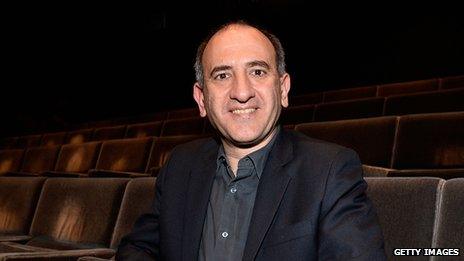
Over the last 22 years, Armando Iannucci has become one of the most innovative and reliable comedy directors in the UK.
The man behind such hits as The Thick of It and its Oscar-nominated spin-off In the Loop, the 50-year-old saw hapless radio DJ Alan Partridge, his co-creation with Steve Coogan, also transfer to the big screen earlier this year.
Iannucci spoke to the BBC about the success of Alan Partridge: Alpha Papa and the many guises its hero has adopted over the last two decades.
You've managed to turn a successful TV show into a successful movie twice now. How did you break the curse?
Ha ha! I think by being very aware of it.
When you do a movie, as opposed to a TV show, it's always tempting to think everything has to be big and exaggerated and spectacular. And in fact, a lot of the funniest comedy films have been very intimate.
Woody Allen isn't someone who goes for huge car chases and special effects, it's just a bunch of people talking in a room. It's important that you go into a film knowing that.
A common thread in your projects is the creative use of language. What lies behind that?
I find it an easy way into writing pieces is to think what the character's voice is like, and start from there.
I suppose it's to do with mimicry. When I started off, I always used to do parodies and impressions, mimicking people... and then institutions. You become aware that some institutions have their own language. You almost define yourself by how you speak.
Alan is a case in point: he has a very specific language and the best way we can write Alan is by being him. So we all end up voicing Alan - obviously Steve's the best at it - and it feels like Alan's in the room and you're writing the show with him.
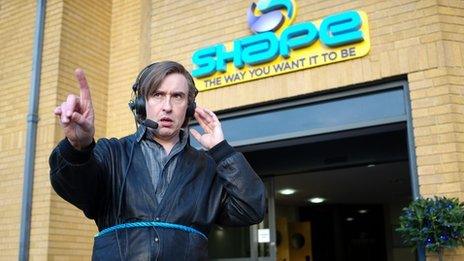
Alpha Papa saw Alan Partridge become involved in a siege
How real is Alan Partridge to you?
It's strange because he's always been in our thoughts. Although we haven't done that much with him - over 20 years the number of episodes are actually quite small - we kind of know what he's been up to.
When Steve and I meet up, we always speculate what Alan's been up to and, if something comes up that makes us laugh, we always make a point of writing it down. I have a Word file that's 200 pages long that's just stray bits of Alan.
He's not a "stock character" like, say, Homer Simpson, who remains the same in every episode.
I like that he's aged in real time over the years. Because we haven't done five series in five years, it's meant that every time we've come back, we've been able to renew him in a way.
Once he was on a chat show, next thing he's in a hotel, then he's in a caravan, next thing you know he's on the radio - because time has gone by.
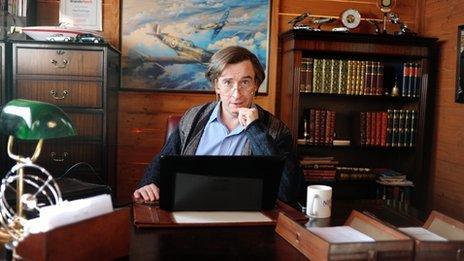
Alan started out in 1991 as a sports reporter on Radio 4's On the Hour
You made a web-only Alan Partridge series called Mid-Morning Matters at one point. Was there more freedom in working like that?
I always feel that if someone says "do what the hell you like", it's actually more tricky. So we always create our own artificial boundaries. For Mid-Morning Matters we knew it had to be 10 minutes, and it couldn't just be Alan talking - it had to have a narrative.
With Knowing Me, Knowing You we had to write it in real time because it was a real TV show; and for I'm Alan Partridge, the thing we told ourselves was Alan had to be in every scene. You couldn't cut away to something Alan didn't know about. So it was all from Alan's point of view.
You shouldn't be aware that those were the constraints that we'd given ourselves. Because the whole point is to arrive at something that covers all that up.
In I'm Alan Partridge, there's a scene where Alan pitches a show called Monkey Tennis to a BBC executive. Is it true you were subsequently asked to make that show?
I wasn't asked, but I have been told by people that Monkey Tennis has come up at ideas meetings on at least three different occasions. And, credit where credit's due, it hasn't been commissioned. Because, when you think about it, it is just monkeys playing tennis.
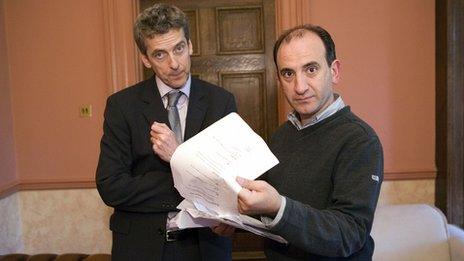
New Doctor Who Peter Capaldi starred as spin doctor Malcolm Tucker in The Thick of It
You made The Thick Of It for the BBC and Veep for HBO. Do you notice a difference in attitude between the two broadcasters? HBO always seems a bit more "full throttle".
That's also the difference between Britain and America. Americans are always unabashed about declaring their successes, whereas we think it's a little bit rude.
I keep saying it to our writers on Veep. They're all British and, whenever we're on the set in America and we've built an enormous life-size replica of the West Wing, they'll say: "This is exciting, isn't it? Oh gosh, they've given us lots of people in the background. Aren't we lucky?"
I have to say: "No, we're not lucky to be here. We're here because we deserve it, because we're writing good stuff."
Does your demeanour change when you cross the Atlantic?
I hope not, but I've always felt confident. When I'm making something, I've always felt in charge and therefore able to call the shots. But what you've got to do is stop that turning into arrogance or despotism!
I always like people to be treated nicely - and I only hire nice people. If I ever see an actor and think, "oh, he's very good - but what an asshole", then he won't be on the show. I just can't be dealing with that on the set on a daily basis.
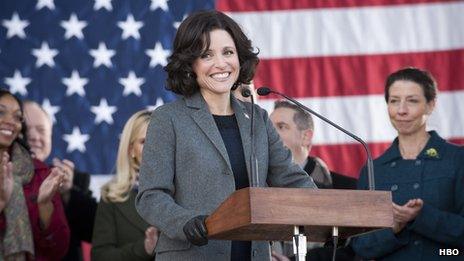
Julia Louis-Dreyfus has won two Emmy awards for playing Selina Meyer in Veep
You were vocally opposed to the closure of the UK Film Council in 2009. How do you think the landscape has changed for British films?
Since doing In the Loop, I've been so busy on Veep that I haven't quite caught up on how things are progressing. But what's heartening is I get the sense that funding hasn't decreased.
Every four or five years there's this debate on whether funding should go on experimental or commercial fare - and there's always a danger that what we do is put a lot of money into trying to pretend to be Hollywood and replicating big action movies and big spy movies. And in fact the British films that do best are the ones that have their own style and are confident about their own story.
Steve Coogan seems to have done exactly that with Philomena. There's even talk he'll get an Oscar nomination...
That is a prime example. It's just a road movie, really, with him and Judi Dench - but it says so much and covers so much. And that's precisely the sort of film we should be investing in.
Alan Partridge: Alpha Papa is out now on DVD and Blu-Ray.
- Published12 August 2013
- Published7 August 2013
- Published13 October 2012
- Published11 September 2012